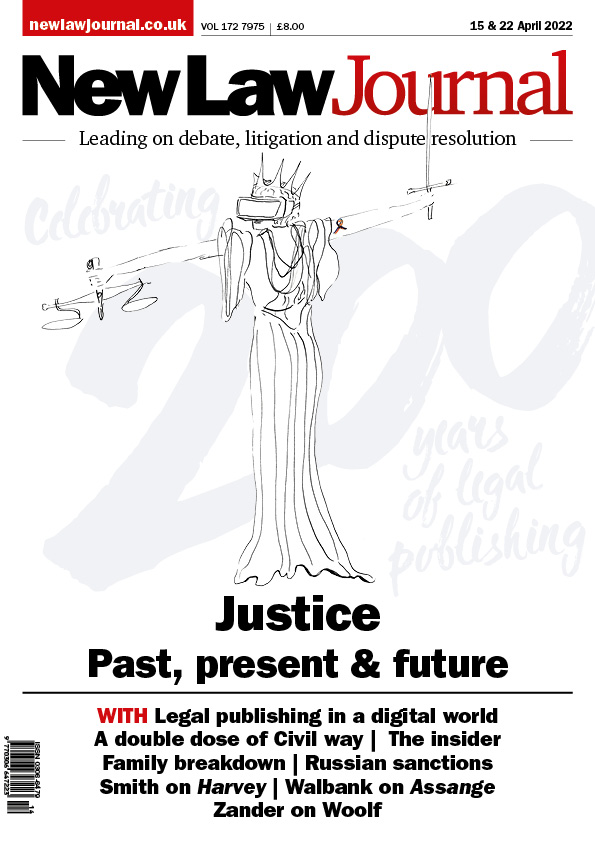THIS ISSUE

Publicans untied; Ombudsman justice; Spad(e)work; Bye bye costs; Latest FPR update; The Great (Rent) Escape; Public to see and hear
Harvey general editor Ian Smith celebrates a very special anniversary with a toast to history & the years to come
David Burrows on the law of family breakdown: where are we now & where are we going?
Sarah Rushton & Sophie Georgiou explore international developments in flexible working & the right to disconnect
Lucy Greenwood & Leonor Díaz-Córdova discuss impactful steps we can all take towards a greener future in arbitration
Can persons on the receiving end of targeted sanctions challenge this designation, & where do their legal representatives stand? Simon Davenport QC & Matthew Happold investigate
Stephen Gold dusts off the archive for the first in an extended series of updates tracing NLJ’s history in tandem with legal and practice developments through the centuries
Dominic Regan shares his predictions on judicial promotions, & maligns the misery caused by much-misunderstood rules on trial witness statements
In the first of a new series focusing on criminal matters in & out of court, David Walbank QC tackles one of the most politically charged criminal cases of recent times
MOVERS & SHAKERS

NLJ Career Profile: Ken Fowlie, Stowe Family Law
Ken Fowlie, chairman of Stowe Family Law, reflects on more than 30 years in legal services after ‘falling into law’

Gardner Leader—Michelle Morgan & Catherine Morris
Regional law firm expands employment team with partner and senior associate hires

Freeths—Carly Harwood & Tom Newton
Nottinghamtrusts, estates and tax team welcomes two senior associates
NEWS
Children can claim for ‘lost years’ damages in personal injury cases, the Supreme Court has held in a landmark judgment
The cab-rank rule remains a bulwark of the rule of law, yet lawyers are increasingly judged by their clients’ causes. Writing in NLJ this week, Ian McDougall, president of the LexisNexis Rule of Law Foundation, warns that conflating representation with endorsement is a ‘clear and present danger’
Holiday lets may promise easy returns, but restrictive covenants can swiftly scupper plans. Writing in NLJ this week, Andrew Francis of Serle Court recounts how covenants limiting use to a ‘private dwelling house’ or ‘private residence’ have repeatedly defeated short-term letting schemes
Artificial intelligence (AI) is already embedded in the civil courts, but regulation lags behind practice. Writing in NLJ this week, Ben Roe of Baker McKenzie charts a landscape where AI assists with transcription, case management and document handling, yet raises acute concerns over evidence, advocacy and even judgment-writing
The Supreme Court has drawn a firm line under branding creativity in regulated markets. In Dairy UK Ltd v Oatly AB, it ruled that Oatly’s ‘post-milk generation’ trade mark unlawfully deployed a protected dairy designation. In NLJ this week, Asima Rana of DWF explains that the court prioritised ‘regulatory clarity over creative branding choices’, holding that ‘designation’ extends beyond product names to marketing slogans






